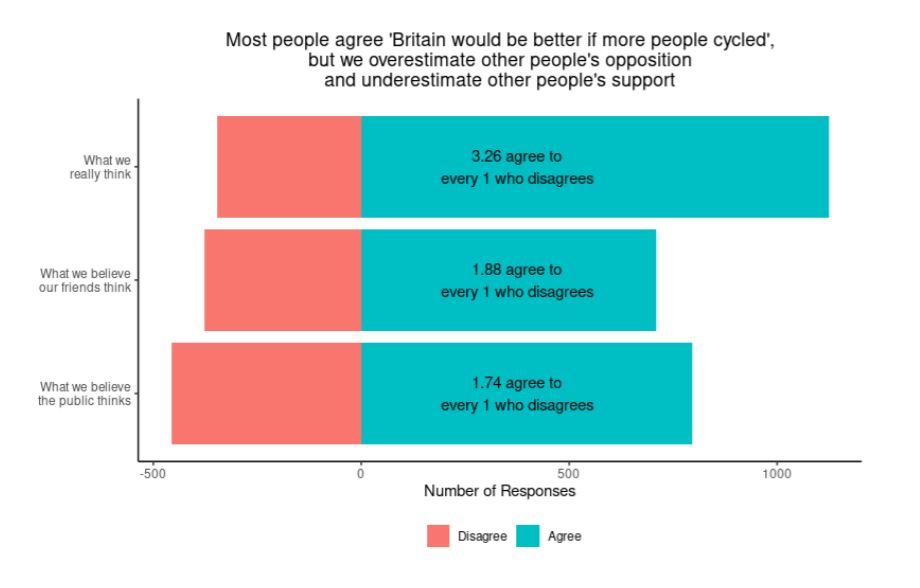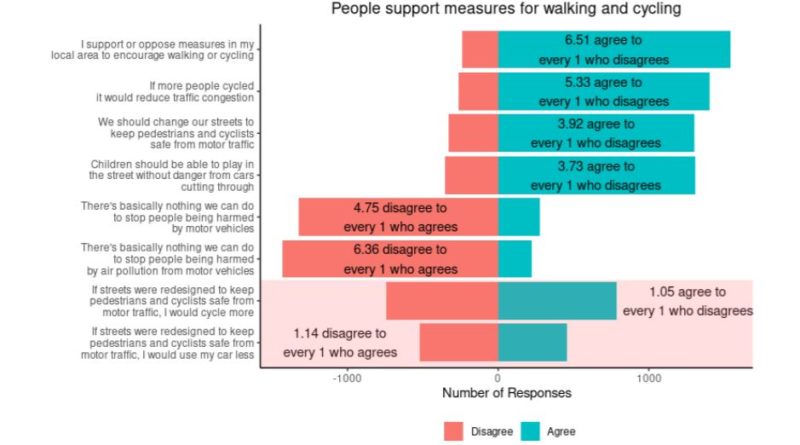Minority successfully pushing back against green recovery, shows YouGov poll
New research by YouGov is illustrating the strength of the motoring lobby against changing the status quo in favour of a green recovery and more infrastructure to encourage active travel.
Much to the dismay of those enjoying safer conditions on the roads, temporary provisions for cyclists and walkers – brought forwards by the Emergency Active Travel fund – are frequently being removed at the first sign of opposition.
In order to demonstrate to local authorities the support for better active travel infrastructure, cycling industry campaign #BikeIsBest has now launched an online petition where people can show their support.
On behalf of #BikeIsBest, YouGov has now found that for every person against a green recovery consisting of more measures to stimulate walking and cycling, 6.5 people are in favour.
The data further found that 80% of Brits who gave a preference when asked desired to see a green recovery shaped around streets redesigned to protect pedestrians and cyclists against motor traffic. Furthermore, as the old adage ‘build it and they’ll come‘ goes, 51% said they would cycle more with such protected conditions in place.
Analysis of the YouGov data by Dr Ian Walker, a prominent Environmental Psychologist at the University of Bath, suggests that people underestimated just how vocal those opposed to safer infrastructure are.

Dr Walker said: “Perhaps one reason negative voices find it so easy to sway things their way is that people have a tendency to misjudge public levels of support. The survey showed that, while most people think Britain would be a better place if more people cycled, they also guessed that other people were less supportive, and more hostile, to the idea than they were.”
To date, 89 local authorities have implemented some form of temporary scheme, with some enthusiastic authorities gaining cash at the expense of those with lacklustre ambition. A total of 503 temporary schemes have been laid down ahead of a second tranche of funding that will further enable local authorities to make successful measures more permanent.
Pro-motoring groups and some local residents have forced u-turns in many locations before any real assessment has been able to take place. Some are dodging their mandated responsibility entirely.
In Reigate, Surrey, a pop-up cycle lane, due to be trialled for three weeks, lasted just three days after pressure from local MP Crispin Blunt. Other green recovery measures pinned to transport due in Ealing, Wandsworth, South Gloucestershire, Trafford, Portsmouth and Surrey have been reportedly cancelled.
The YouGov data reveals that 70% of people believe greater levels of cycling would actually benefit the motorist in terms of reduced congestion.
The data further showed that 3.26 people support the thinking that Britain would be better if more people cycled” for every 1 against. But when asked what they thought the opinion of their friends or the general public would be, many respondents drastically overestimated the negativity towards cycling.
Adam Tranter, a spokesperson for #BikeIsBest and an active travel campaigner, said: “The small minority getting all revved up about their right to drive are having their voices heard through sheer volition. If the silent majority want to see this new, greener, better Britain, they need to act now or face going back to the old normal, with polluted and dangerous streets.
“When 20mph streets were first proposed, pro-motoring groups were whipped up into a frenzy, just as they are today. In 2017, data showed that the proportion opposed or strongly opposed to residential 20mph limits was just 10%. The same is happening here with measures to enable more people to switch their journeys to cycling and walking.”
He added: “No-one is saying that all journeys can be cycled or walked but many of our towns and cities are experiencing congestion – not because of cycle lanes but because of people using their car for short journeys, often under 2 miles. Local authorities need to stand up and refuse to be bullied into a U-turn on plans to turn Britain into a better place. These are plans the public agree with, so people also need to speak up so their silence isn’t taken as consent to keep our streets dominated by motor vehicles.”
Other key information included the finding that:
- 65% (rising to 79%, when people with no opinion are excluded) believe children should be able to play in the street without danger from cars cutting through. Many councils are planning “Low Traffic Neighbourhoods” to enable this, but these have started to run into exactly the sort of vocal local opposition described above.
- 66% (rising to 83% of those with an opinion one way or the other) disagree that there is ‘nothing that can be done to stop people from being harmed by motor vehicles’, showing the public do not see the problems of motoring as a ‘done deal’.
- Similarly, 71% (rising to 86% of those with an opinion) disagree that there is ‘nothing we can do to stop people being harmed by air pollution caused by motor vehicles’.
- 33% – and 35% of regular car commuters – would use their car less if streets were designed to keep pedestrians and cyclists safe from motor traffic. These values rise to 47% and 46% when people with no opinion are put aside.
- 10.6 people support local measures to encourage cycling and walking to each 1 opposed in the 18-24 age bracket, whereas in the 55+ bracket this falls to 4.56 people in favour to each 1 against.
- Young people want a future cycling nation: 5.1 people think “Britain would be a better place if more people cycled” in the 18-24 age bracket, for every 1 person opposed.
2,010 people aged 18+ were surveyed.



